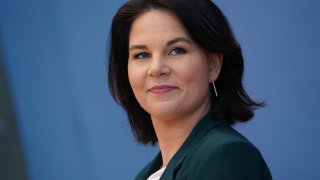
- The Greens' popularity has risen in recent years and the polls now have them as only a few percentage points behind Merkel's CDU party, as more and more voters turn to climate-related topics.
- Baerbock and Robert Habeck, co-leaders of the party, seem to have united and disciplined members like no other leadership team has done before.
- And the new goal is not only to be part of the government, but perhaps even enter the chancellery later this year.
Annalena Baerbock has been selected as the Green Party candidate to be the next German chancellor, as the country gears up for elections this year where Angela Merkel will exit the political stage.
Watch NBC6 free wherever you are
The Greens' popularity has risen in recent years and the polls now have them as only a few percentage points behind Merkel's CDU party, as more and more voters turn to climate-related topics.
Baerbock and Robert Habeck, co-leaders of the party, seem to have united and disciplined members like no other leadership team has done before. And the new goal is not only to be part of the government, but perhaps even enter the chancellery later this year.
Get local news you need to know to start your day with NBC 6's News Headlines newsletter.
The advent of the Green Party has coincided with its professionalization. It started off as a protest movement and an opposition party. It was divided into a left and a more conservative wing for many years. While that hasn't changed completely, the party is now a true middle-class platform.
Who is Annalena Baerbock?
Baerbock was born in 1980 close to Hannover. She graduated from the London School of Economics in 2005 with a Master's in Public International Law. She's been a member of the party since 2005 and a member of the Bundestag since 2013.
Money Report
During her political career she has served in various roles: She was spokesperson for climate change of the Green Parliamentary Group between 2013 and 2017 and a deputy member of the Committee on Economic Affairs and Energy. Some commentators liken her style and analytical approach to that of current German leader Merkel.
What is the Green Party's program?
The Greens want to restructure the economic model of Germany into a social-ecological system. What does that mean? Clearly the focus is on pushing green technologies, exiting coal energy by 2030 and banning cars with combustion engines from German roads by 2030. That's ambitious given that it's only nine years away.
German industry is already ringing the alarm bells: "The Greens want a different society," said the BDI in a statement on March 19. "The restructuring of the society will be very expensive for the economy and the society itself, we would need a much more growth friendly policy approach after the pandemic for Germany."
But the Greens are no longer a party full of radicals, they have a plan in mind to finance their program. While the party program calls for the relaxation of the so-called debt brake which would enable Germany to raise more money on public markets, they also call for higher taxes on the wealthy.
On top of that, they are pushing for a 500 billion euro fund over 10 years to finance this climate transition.
"This is clever political marketing directed at liberal middle-class voters," said Carsten Nickel of Teneo in a note last month.
The key question is which role the Greens will play in the next government, with elections due in September. It only has an outside chance it will enter the chancellery, but it's not completely impossible.
If the CDU fails to gain a majority alongside another party, including the Greens, then a possible SPD, Left and Green coalition could form in Berlin. And in that case, the next chancellor could well be Baerbock.






